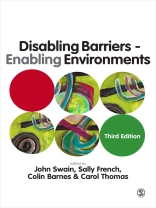Since it was first published in 1993, Disabling Barriers, Enabling Environments has established itself as essential reading for anyone coming to the subject of disability studies. The book tackles a wide range of issues in numerous succinct chapters written by contributing authors, many of whom are disabled themselves. From the outset, the chapters take a multidisciplinary and international approach.
The third edition is made up of 42 chapters, 15 of which are completely new to this edition, including:
· Early seminal writings in disabled studies
· Death and dying
· Psychology
· Hate crime and the criminal justice system
· Sport
· Psycho-emotional disablism and internal oppression.
This seminal textbook conveys the continuing developments in the lives and experiences of disabled people. It is valuable reading for students and professionals in the fields of social work, sociology, social policy, health and nursing as well as disabled people.
สารบัญ
Introduction – Sally French
PART ONE: PERSPECTIVES ON DISABILITY AND IMPAIRMENT
An Historical Overview
Disability and Impairment – Carol Thomas
Disability, Disability Studies and the Academy – Colin Barnes
Developing an Affirmative Model of Disability and Impairment – Colin Cameron
Dependence, Independence and Normality – Colin Goble
Reflections on Doing Emancipatory Disability Research – Colin Barnes
International Perspectives on Disability – John Swain and Sally French
PART TWO: IN OUR OWN IMAGE
Disability and the Body – Bill Hughes
Disability and Psychology – Dan Goodley
Women and Disability – Alison Sheldon
Men, Masculinities and Disability – Steve Robertson and Brett Smith
Lying Down Anyhow: Disability and the Rebel Body – Liz Crow
Psycho-emotional Disablism and Internalised Oppression – Donna Reeve
Generating Debates: Why We Need a Life-Course Approach to Disability Issues – Mark Priestley
The Representation of Disabled People in the News Media – Robert Williams-Findlay
Disability Culture: The Story So Far – Alison Wilde
′Race′, Ethnicity and Disability – Yasmin Hussain
Who Is Disabled? Exploring the Scope of the Social Model of Disability – Dan Goodley
Disabled People, Disability and Sexuality – Selina Bonnie
PART THREE: CONTROLLING LIFESTYLES
Challenging Barriers and Enabling Inclusion: the Role of Families – Dawn Benson and Sarah Keyes
Disability and Childhood: A Journey towards Inclusion – John M. Davis
Housing and Independent Living – Laura Hemingway
Changing Technology – Alison Sheldon
Communication Barriers: Building Access and Inclusive Relationships – Alan Hewitt and Carole Pound
Controlling Exclusion in Education – Michele Moore
User Involvement in Services for Disabled People – Sally French
User-Led Organisations: Facilitating Independent Living? – Hannah Morgan
Accessing Social and Leisure Activities: Barriers to Inclusion Experienced by Visually Impaired People – Donna Marie Brown, Pauline Gertig and Maureen Gillman, with Joyce Anderson, Cathy Clarke and Simon Powell
Disability, Sport and Exercising Bodies – Brett Smith and Anthony Papathomas
Disability and Ageing – Ann Macfarlane
Disabled People, Work and Welfare – Alan Roulstone
PART FOUR: IN CHARGE OF SUPPORT AND HELP
Care: Controlling and Personalising Services – Sarah Woodin
Counselling and Disabled People: Help or Hindrance? – Donna Reeve
Developments in Mental Health Policy and Practice: Service User Critiques – Peter Beresford
The Global Economy of ′Care′ – Maria Berghs
PART FIVE: LOOKING TO THE FUTURE FOR DISABLED PEOPLE
Disability and Social Inclusion in the Information Society – Sally French and John Swain
Designing Inclusive Environments and the Significance of Universal Design – Rob Imrie
Genetics, Disability and Bioethics – Alice Maynard
Disability, Death and Dying: A Rights-Based Discussion of the Ultimate Barrier Facing Disabled People – Bill Armer
Hate Crime and the Criminal Justice System – Pam Thomas
Human Rights in Context: Making Rights Count – Marcia Rioux and Bonita Heath
The Future of Disability Studies – Alison Sheldon
เกี่ยวกับผู้แต่ง
Carol Thomas is a Professor of Sociology at Lancaster University.












